人教版(2019)新教材高中英语必修第二册第四单元词汇学案
Unit4HistoryAndTraditions学案 高中英语人教版(2019)必修第二册
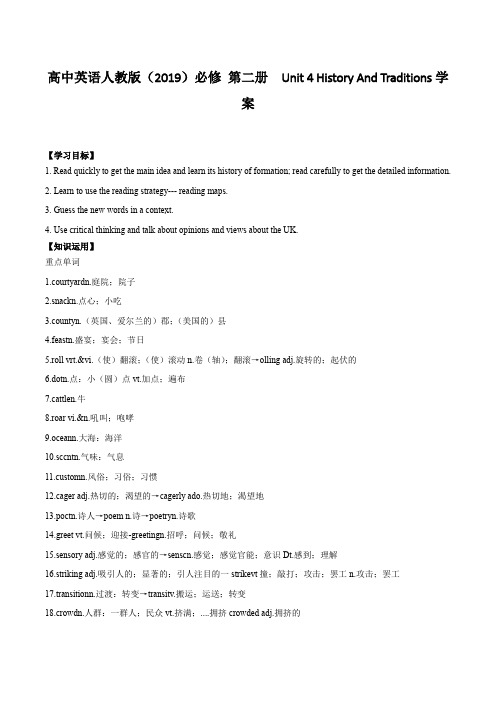
高中英语人教版(2019)必修第二册Unit 4 History And Traditions学案【学习目标】1. Read quickly to get the main idea and learn its history of formation; read carefully to get the detailed information.2. Learn to use the reading strategy--- reading maps.3. Guess the new words in a context.4. Use critical thinking and talk about opinions and views about the UK.【知识运用】重点单词1.courtyardn.庭院;院子2.snackn.点心;小吃3.countyn.(英国、爱尔兰的)郡;(美国的)县4.feastn.盛宴;宴会;节日5.roll vrt.&vi.(使)翻滚;(使)滚动n.卷(轴);翻滚→olling adj.旋转的;起伏的6.dotn.点:小(圆)点vt.加点;遍布7.cattlen.牛8.roar vi.&n.吼叫;咆哮9.oceann.大海:海洋10.sccntn.气味:气息11.customn.风俗;习俗;习惯12.cager adj.热切的;渴望的→cagerly ado.热切地;渴望地13.poctn.诗人→poem n.诗→poetryn.诗歌14.greet vt.问候;迎接-greetingn.招呼;问候;敬礼15.sensory adj.感觉的;感官的→senscn.感觉;感觉官能;意识Dt.感到;理解16.striking adj.吸引人的;显著的;引人注目的一strikevt撞;敲打;攻击;罢工n.攻击;罢工17.transitionn.过渡:转变→transitv.搬运;运送;转变18.crowdn.人群:一群人;民众vt.挤满;....拥挤crowded adj.拥挤的掌握规律巧记单词greeto.问候:迎接+ing→reetingn.招呼:问候:敬礼如:sailing 航海;航行skating 滑冰:溜冰sking 滑雪I I.核心短语1.have an influence on sth.对...影响2.a fcast for the cycs视觉盛宴3.be dotted with..布满:点缀4.make up组成5.more than很;非常6.be likely to do sth.可能做某事【阅读探究】What’s in a name?1.What are the four countries of the United Kingdom? Which two were the first to be joined together?2.According to the text, what are two chief advantages of studying the history of a country?3.What might “a name” here refer to?【句型梳理】1.So what is the difference between them, if any?如果有的话,那么他们之间的区别是什么?本句中if any是省略句,补全句子是:if there is any difference。
人教版高中英语必修二unit4学习教案

人教版高中英语必修二unit4学习教案教案内容:一、教学内容本课教材为人教版高中英语必修二Unit 4,主要内容包括三个部分:A部分为阅读理解,介绍了一位美国学生在中国过春节的经历;B 部分为听力练习,围绕春节习俗和文化展开;C部分为写作任务,要求学生以春节为话题写一篇短文。
二、教学目标1. 学生能够掌握本课的生词和短语,提高阅读理解能力。
2. 学生能够通过听力练习,了解并区分不同的春节习俗,提高听力技能。
3. 学生能够运用所学知识,以春节为话题写一篇短文,提高写作能力。
三、教学难点与重点重点:1. 掌握本课的生词和短语。
2. 提高阅读理解能力。
3. 提高听力技能。
4. 提高写作能力。
难点:1. 理解和运用本课的语法知识点。
2. 准确表达自己的观点和感受。
四、教具与学具准备教具:多媒体教学设备、录音机、听力材料。
学具:课本、练习册、笔记本、录音笔。
五、教学过程1. 引入:教师通过向学生介绍春节的来历和习俗,激发学生的学习兴趣。
2. 阅读理解:学生阅读A部分的文章,回答相关问题。
教师通过提问,检查学生的阅读理解能力。
3. 听力练习:学生听B部分的录音,回答相关问题。
教师通过提问,检查学生的听力技能。
4. 课堂讨论:教师组织学生就春节习俗和文化进行讨论,引导学生运用所学知识。
5. 写作任务:学生根据C部分的要求,以春节为话题写一篇短文。
教师通过批改,检查学生的写作能力。
六、板书设计板书内容:1. 生词和短语。
2. 语法知识点。
3. 春节习俗和文化。
七、作业设计1. 作业题目:请根据本课所学内容,写一篇关于春节的短文。
答案:略答案:略八、课后反思及拓展延伸重点和难点解析一、教学内容的选择与安排教学内容的选择应紧密结合学生的实际需求和兴趣,以及课程标准的要求。
在本教案中,选择了人教版高中英语必修二Unit 4,内容涉及春节的阅读材料、听力练习和写作任务。
这样的内容选择不仅与学生的日常生活紧密相关,而且能够激发他们的学习兴趣。
Unit 4 词汇学案 2021-2022学年高中英语人教版(2019)必修第二册

Unit 4 Book 2 导案1.Confucius [kən'fju:ʃjəs]n.孔子音意相通:孔夫子破拆法:confuc-(confuse使困惑)+-ius(形容词后缀):令人困惑的助记:孔子的一些理论令人很困惑2.mansion ['mænʃ(ə)n]n.公馆,宅邸破拆法:man(人)+-sion(名词后缀):给人住的宅子——宅邸,公馆3.cemetery ['semɪtrɪ]n.墓地,公墓破拆法:ce-(co-共同)+met-(meet见面)+-ery(名词后缀):最终大家见面的地方——墓地4.philosophy [fɪ'lɒsəfɪ]n.哲学;哲理;人生观词根词缀:philo-(爱) + -sophy(智慧)音意相通:肥了社会助记:合适的哲学能够促进社会的发展。
5.descendant [dɪ'send(ə)nt] n.后裔;子孙adj.下降的;祖传的破拆法:de-(向下)+scend-(send送)+-ant(名词/形容词后缀):往下送的的人——后裔,子孙。
His design was a descendant of a 1956 device. 他的设计是从一个1956年的装置衍生而来的。
She is a direct descendant of Queen Victoria. 她是维多利亚女王的嫡系后代。
6.individual [ɪndɪ'vɪdjʊ(ə)l;ɪndɪ'vɪdʒuəl] adj.个人的;个别的n.个人,个体词根词缀:in-(否定前缀)+divid-(divide分开)+-ual(形容词后缀):不可再分开的——个体Their child is at the stage where she can say individual words but not full sentences.(2019天津)他们的孩子正处于能说单个单词而不能说完整句子的阶段。
10 Book2 Unit4 -高一英语构词法及词性分类背诵与默写学案(人教版2019)

最新人教版高中英语必修二第四单元构词法及词性分类背诵与默写学案(背诵版)骆海燕编Unit 4 History and traditions派生词大集合:单元词汇按构词法分类记忆。
注:黑体部分为课标词和短语。
备注:1、不收录人名和地名。
2、单元大部分词汇按构词法分类记忆,其余的另外归类记忆。
Unit 4 History and traditions(背诵版)动词、名词、形容词、副词、短语归类复习(注意一个单词多种词性!动词为先!)
【练练基本功·课前练习】写出下列动词的过去式,过去分词,现在分词,第三人称单数。
(需特别注意
Unit 4 History and traditions(默写版)动词、名词、形容词、副词、短语归类复习(注意一个单词多种词性!动词为先!)
【练练基本功·课前练习】写出下列动词的过去式,过去分词,现在分词,第三人称单数。
(需特别注意动词不规则变形!)
最新人教版高中英语必修二第四单元构词法及词性分类背诵与默写学案(背诵版)骆海燕编Unit 4 History and traditions派生词大集合:单元词汇按构词法分类记忆。
注:黑体部分为课标词和短语。
备注:1、不收录人名和地名。
2、单元大部分词汇按构词法分类记忆,其余的另外归类记忆。
Unit+4+词汇学习课件 高中英语人教版(2019)必修第二册

striking [ˈstraɪkɪŋ] adj. 引人注目的;显著的 strike [straɪk]
v. 撞击;打;踢(球等);突击;罢工
striker [ˈstrห้องสมุดไป่ตู้ɪkər] n. 罢工者;打击者
crowd [kraʊd] n. 人群;观众 v.挤满;使…拥挤
n.环境;周围的事物
evidence ['evɪdəns] n. 证据;证明
evident [ˈevɪdənt] adj. 明显的;明白的
evidently [ˈevɪdəntli] adv. 明显地;清楚地
achievement [ə'tʃivmənt] n. 成就;成绩;达到 achieve [əˈtʃiːv] v. 取得; 获得; 实现; 成功 achievable [əˈtʃiːvəbl]
conquerable [ˈkɒŋkərəbl] adj. 可征服的;可战胜的
fascinating [ˈfæsɪneɪtɪŋ ] adj. 极有吸引力的;迷人的
fascinate [ˈfæsɪneɪt] v. 使着迷;使神魂颠倒 fascinated [ˈfæsɪneɪtɪd]
adj. 着迷的;被深深吸引的
greet [ɡriːt] v. 问候;迎接
greeting [ˈɡriːtɪŋ] n. 问候,招呼;祝贺
sensory [ˈsensəri]
adj. 感觉的;知觉的;传递感觉的
sense [sens]
n. 感觉;道理;理智
sensible [ˈsensəbl]
adj. 明智的;通情达理的;合乎情理的
adj. 渴望的;热切的;热心的
高中英语人教新课标必修二必修2 第四单元单元单词导学案设计(无答案)

Unit 4一、Key words1.protect v. n.protect/keep/prevent/stop...from doing sth2.decreaseon the decrease decrease todecrease by decrease from...to...decrease&diminishdecrease减少;渐渐地、匀速地减diminish 减少;从整体中一点一点地取出一部分3.respond vi. n.respond to...回应...;对...作出反应respond thatmake (no) response to3.mercy n. adj.show mercy to sbhave mercy onat the mercy of 在...的摆布下;在...支配下without mercy 毫无同情心地4.affect v. n. 同义:affect&effectaffect主要作动词用,意为“影响”(have a effect on )effect主要用作名词,指affect(影响)的结果effect用作动词时,表示“产生”、“实现”5.appreciate v. n.6.succeed v. n.adj. adv.succeed (in) doing sthsucceed to sth7.harm n&vt adj.be harmful to 对...有害(反义):do harm to sb./sth = do sb./sth harmthere is no harm in(doing)sth 做某事无害处二、Phrases1.die out die awaydie down die offdie of die from3.in danger(of) out of danger be a danger to sb/sthe into being = come into existence拓展:come into effect/force/operation 生效;实施come into reality 实现;变成现实come into use/service 开始被使用come into power/office 当权;上台执政come into sight/view 看见;映入眼帘Examples:5.according to6.long before&before long7.in relief如释重负to one’s relief 令某人宽慰的是What a relief让人放心了relief sb.of...解除某人的(负担、痛苦等)8.pay attention to (doing) sth三、Key structuresA party is being held tonight.Paper and plastic bags are being thrown away by many tour visitors .四、针对训练1.When do the new driving laws (执行)2.he (回答说)he would be pleased to attend the party.3.Did he (成功通过)the exam.4.Greek people often wear a blue necklace(免受灾祸)evils.5.as a result these endangered animals may even (灭绝)6. A new railway (build)here at present.7.-Do you know what Lily is doing?-She may (interview).8.The country is trying to control the number of people (affect) by AIDS.9.We had no choice but to be the sea.10.The child the toys.(注意力集中在)。
人教版高中英语 必修2 第四单元重点词汇讲解 教案专题
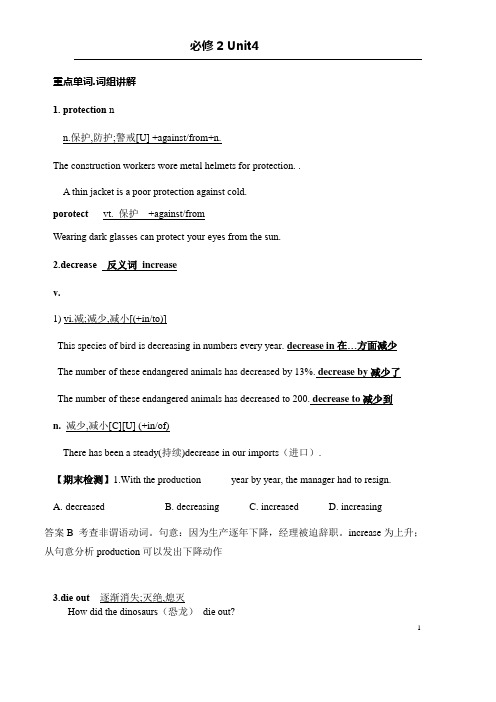
重点单词.词组讲解1. protection nn.保护,防护;警戒[U] +against/from+n.The construction workers wore metal helmets for protection. .A thin jacket is a poor protection against cold.porotect vt. 保护+against/fromWearing dark glasses can protect your eyes from the sun.2.decrease反义词increasev.1) vi.减;减少,减小[(+in/to)]This species of bird is decreasing in numbers every year. decrease in在…方面减少The number of these endangered animals has decreased by 13%. decrease by减少了The number of these endangered animals has decreased to 200. decrease to减少到n. 减少,减小[C][U] (+in/of)There has been a steady(持续)decrease in our imports(进口).【期末检测】1.With the production _____ year by year, the manager had to resign.A.decreasedB. decreasingC. increasedD. increasing答案B 考查非谓语动词。
句意:因为生产逐年下降,经理被迫辞职。
increase为上升;从句意分析production可以发出下降动作3.die out逐渐消失;灭绝,熄灭How did the dinosaurs(恐龙)die out?1Many old customs have died out. 许多旧的风俗已不复存在。
2019-2020年人教版高中英语必修二Unit 4《Wildlife》word单词学案
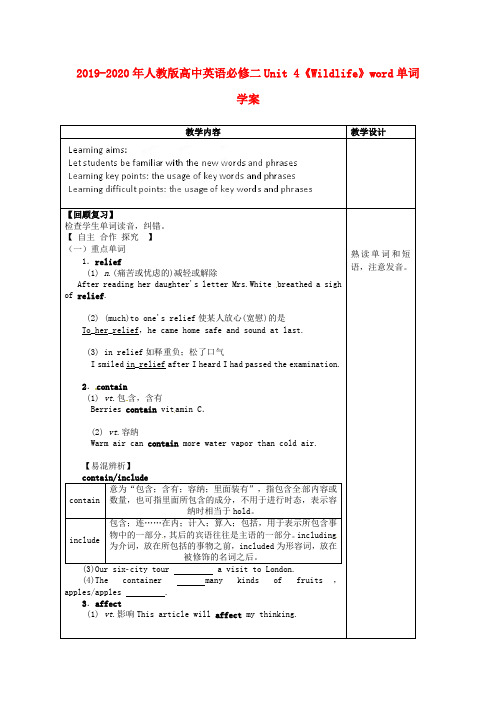
A.harm B.trouble C.damage D.hurt
【反思提升】:
同桌互查本节课所学的重点单词短语的用法。
【.拓展延伸】
Make sentences by yourself using key words and phrases we learned just now.
参考答案
1 (1)读完女儿的来信,怀特太太宽慰的松了口气。
(2)使他感到欣慰的是,他平安无事的回家了。
(3)听说我已经通过了考试,我轻松的笑了。
2(1)果浆含有维生素C。
(2)vt.伤害,损害
I assure y ou that this medicine cannotharmyou.
(3)do sb./sth.harm=do harm to sb./sth.伤害某人/某事;对某人/某事有害
It wouldn'tdo_her_any_harmto work a bit harder.
(4)be harmபைடு நூலகம்ul to...对……有害
This file may contain a virus that canbe_harmful_toyour computer.
8.die out
(1)Those species inadaptable to changing conditions maydie out.
(2) die away(声音、光线、风等)渐弱;渐息
die down(火、兴奋、暴风雨、光线、声音等)渐弱;渐息be dying for sth./to do sth.渴望/极想做某事
Unit 4 单词学案及当堂检测 2021-2022学年高中英语人教版(2019)必修第二册
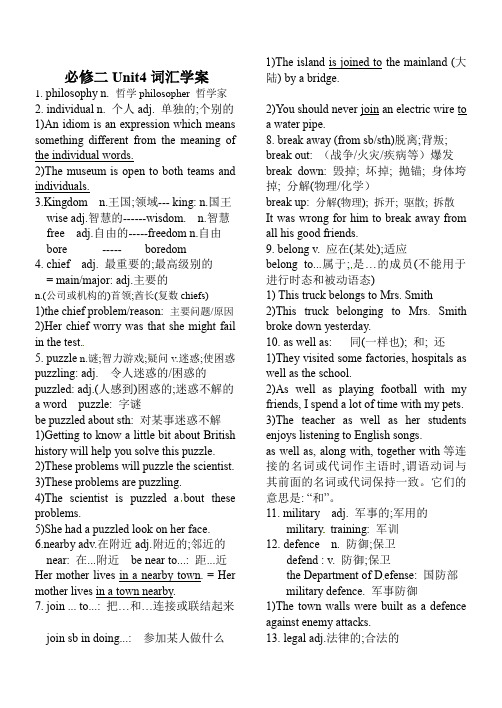
必修二Unit4词汇学案1.philosophy n. 哲学philosopher 哲学家2. individual n. 个人adj. 单独的;个别的1)An idiom is an expression which means something different from the meaning of the individual words.2)The museum is open to both teams and individuals.3.Kingdom n.王国;领域--- king: n.国王wise adj.智慧的------wisdom. n.智慧free adj.自由的-----freedom n.自由bore -----boredom4. chief adj. 最重要的;最高级别的= main/major: adj.主要的n.(公司或机构的)首领;酋长(复数chiefs)1)the chief problem/reason: 主要问题/原因2)Her chief worry was that she might fail in the test.5. puzzle n.谜;智力游戏;疑问v.迷惑;使困惑puzzling: adj. 令人迷惑的/困惑的puzzled: adj.(人感到)困惑的;迷惑不解的a word puzzle: 字谜be puzzled about sth: 对某事迷惑不解1)Getting to know a little bit about British history will help you solve this puzzle.2)These problems will puzzle the scientist.3)These problems are puzzling.4)The scientist is puzzled a bout these problems.5)She had a puzzled look on her face.6.nearby adv.在附近adj.附近的;邻近的near: 在...附近be near to...: 距...近Her mother lives in a nearby town. = Her mother lives in a town nearby.7. join ... to...: 把…和…连接或联结起来join sb in doing...: 参加某人做什么1)The island is joined to the mainland (大陆) by a bridge.2)You should never join an electric wire toa water pipe.8. break away (from sb/sth)脱离;背叛; break out: (战争/火灾/疾病等)爆发break down: 毁掉; 坏掉; 抛锚; 身体垮掉; 分解(物理/化学)break up: 分解(物理); 拆开; 驱散; 拆散It was wrong for him to break away from all his good friends.9. belong v. 应在(某处);适应belong to...属于;是…的成员(不能用于进行时态和被动语态)1) This truck belongs to Mrs. Smith2)This truck belonging to Mrs. Smith broke down yesterday.10. as well as: 同(一样也); 和; 还1)They visited some factories, hospitals as well as the school.2)As well as playing football with my friends, I spend a lot of time with my pets.3)The teacher as well as her students enjoys listening to English songs.as well as, along with, together with等连接的名词或代词作主语时,谓语动词与其前面的名词或代词保持一致。
高一英语必修第二册(2019版)_Unit4_Listening_and_S导学案

Unit4 Listening and Speaking and Talking 导学案1. To understand the content of listening texts in terms of the whole and key details;2. To guess the meaning of words in listening; discuss with their peers how to talk about historic spots and great person.3. To use functional sentences of showing one’s excitement, surprise and disappointment.1. To understand the content of listening texts in terms of the whole and key details;2. To discuss with their peers the related topics.3. To use the functional items of showing one’s excitement, surprise and disappointment.Part 1: Listening and SpeakingStep 1: Lead in•Share views on historic sites•Before you listen, look at some photos of Qufu. What can you say about these places?Temple of Confucius Kong Family Mansion Cemetery of ConfuciusStep 2: PredictionAfter their small talk, the teacher can ask students to predict what the listening text is about by looking at the pictures.The listening text is probably about ___________________________________________Step 3:Listen to a conversation between a British tourist and a Chinese student in Qufu, and then write down what they say about Confucius.William’s opinions / facts about Confucius:1.He is one of his favorite __________.2. He was a __________man.3.He lived over _____years ago.Xiao Kong’s opinions / facts about Confucius:1.Confusius has over ___million descendants.2.He was a great ______and had many ideas about ________.3.He was one of the ___________minds in history.Step 4: After finishing the task above, the teacher plays the same material again and after finishing listening, the students need to solve the following task.• 1.Listen again and decide whether these statements are true(T), false(F), or not mentioned (NM). Then answer the question.• 1. Confucius said that learning without understanding leads to confusion.• 2. Xiao Kong is doing a research project on Confucius philosophy.• 3. As one of Confucius' descendants, Xiao Kong's name is recorded in the family tree.• 4. Dacheng Hall is the tallest building in Qufu.2. Why do you think William said his hometown was similar to Qufu?His hometown doesn’t allow other __________________to be more ______________________than his historic buildings.Step 5: Write down the English idioms that are used in the conversation. Explain their meanings and think about some Chinese equivalents.English Idioms Meaning Chinese equivalentAchilles’ heel Something that is someone’s __________________________Pull one’s leg To _______ with someone _______Fish out water Someone who feels _______ because _______they are in an unfamiliar placeListening tip:Understand idiomsAn idiom is an expression which means something different from the meaning of the individual words. Some idioms present an idea or paint a picture that gives a hint as to the meaning. Other idioms can only be understood from the context in which they appear.Step 6: Speaking ProjectWork in pairs or groups and role play a conversation.•Discuss the questions in groups.1. What do you know about Confucius' ideas on education? Think of two or three examples.2. What else do you know about Confucius and his philosophy?3. Think about a historic site that you have visited, and give an introduction to its history and importance.Part 2: Listening and TalkingStep1:Listen to the tape, which is about Pingyao ancient town for the first time, and then ask the students to solve the following tasks.Backpacker Paul is talking to a receptionist at an international youth hostel in Pingyao, China. Listen to the conversation and tick the places mentioned.•Ming-Qing Street•Ancient Government Office•Qiao Family Courtyard•Wang Family Courtyard•Rishengchang Bank•Mount Mian•the city wall•Zhengguosi Temple•Shuanglin TempleStep 2. Listen once more. Complete the sentences to describe how the speakers felt.•I had expected something different.•Paul sounded_________________________•It was like walking into history.•Paul sounded_________________________•It wasn't as big as I had expected.•Paul sounded_________________________•Some of the snacks there are amazing.•Xiao Yan sounded_________________________•I had no idea there would be so many tourists.•Paul sounded_________________________•Wow, I can't believe you didn't see the wall.•Xiao Yan sounded_________________________Step 3: Speaking ProjectWork in groups.Imagine one of you has just visited Pingyao. Work in pairs and role-play the conversation below. Then continue the conversation using the following expressions.Expressing excitement, surprise, and disappointment:I had no idea ...;I didn't know .;I was eager/surprised to see/learn/hear that ;It was so much fun! It was a little disappointing; It wasn't as good/interesting/fun as I'd expected._________________________________________________________________________________ _________________________________________________________________________________ _________________________________________________________________________________ _________________________________________________________________________________ _________________________________________________________________________________ _________________________________________________________________________________ _________________________________________________________________________________ _________________________________________________________________________________ _____________________________________________________________Homework:Work in groups.Take turns telling each other about a historic place that you have been to.【答案】Part 1: Listening and SpeakingStep 1: Lead in•Share views on historic sites•Before you listen, look at some photos of Qufu. What can you say about these places?The buildings are famous historic spots which were built to honor a famous Chinese educator called Confucius.Step 2: PredictionAfter their small talk, the teacher can ask students to predict what the listening text is about by looking at the pictures.The listening text is probably about the introduction of a great educator--ConfuciusStep 3:Listen to a conversation between a British tourist and a Chinese student in Qufu, and then write down what they say about Confucius.William’s opinions / facts about Confucius:1.He is one of his favorite __________.2. He was a __________man.3.He lived over _____years ago.Xiao Kong’s opinions / facts about Confucius:1.Confusius has over ___million descendants.2.He was a great ______and had many ideas about ________.3.He was one of the ___________minds in history.1.philosophers2.wise3.25004.3catorcation7.greatestStep 4: After finishing the task above, the teacher plays the same material again and after finishing listening, the students need to solve the following task.• 1.Listen again and decide whether these statements are true(T), false(F), or not mentioned (NM). Then answer the question.• 1. Confucius said that learning without understanding leads to confusion. F• 2. Xiao Kong is doing a research project on Confucius philosophy.F• 3. As one of Confucius' descendants, Xiao Kong's name is recorded in the family tree.NM• 4. Dacheng Hall is the tallest building in Qufu.T• 2.Why do you think William said his hometown was similar to Qufu?•His hometown doesn’t allow other __________________to be more ______________________than his historic buildings.Buildings /noticeableStep 5: Write down the English idioms that are used in the conversation. Explain their meanings and think about some Chinese equivalents.English Idioms Meaning Chinese equivalentAchilles’ heel Something that is someone’s weakness 弱点要害Pull one’s leg To joke with someone 戏弄Fish out water Someone who feels uncomfortablebecause they are in an unfamiliar place 如芒在背Listening tip:Understand idiomsAn idiom is an expression which means something different from the meaning of the individual words. Some idioms present an idea or paint a picture that gives a hint as to the meaning. Other idioms can only be understood from the context in which they appear.Step 6: Speaking ProjectWork in pairs or groups and role play a conversation.•Discuss the questions in groups.1. What do you know about Confucius' ideas on education? Think of two or three examples.1).It is useful to go over what we have learned regularly.2).Teachers should educate their students based on their different learning styles and talents.2.What else do you know about Confucius and his philosophy?He thought that students should turn to those who knows better than them for help. There is no need to feel ashamed if the person to whom they ask for help is less intelligent than them.3. Think about a historic site that you have visited, and give an introduction to its history and importance.The old palace is a place where the Chinese emperors once lived and is world famous historic spot, which is well worth a visit and finds great value in history and importance.Part 2: Listening and TalkingStep1:Listen to the tape, which is about Pingyao ancient town for the first time, and then ask the students to solve the following tasks.Backpacker Paul is talking to a receptionist at an international youth hostel in Pingyao, China. Listen to the conversation and tick the places mentioned.•Ming-Qing Street•Ancient Government Office•Qiao Family Courtyard•Wang Family Courtyard•Rishengchang Bank•Mount Mian•the city wall•Zhengguosi Temple•Shuanglin TempleStep 2. Listen once more. Complete the sentences to describe how the speakers felt.•I had expected something different.•Paul sounded_________________________•It was like walking into history.•Paul sounded_________________________•It wasn't as big as I had expected.•Paul sounded_________________________•Some of the snacks there are amazing.•Xiao Yan sounded_________________________•I had no idea there would be so many tourists.•Paul sounded_________________________•Wow, I can't believe you didn't see the wall.•Xiao Yan sounded_________________________1.disappointed2.amazed3.disappointed4.amazed5.surprised6.surprisedStep 3: Speaking ProjectWork in groups.Imagine one of you has just visited Pingyao. Work in pairs and role-play the conversation below. Then continue the conversation using the following expressions.Expressing excitement, surprise, and disappointmentI had no idea ...I didn't know .I was eager/surprised to see/learn/hear that -It was so much fun! It was a little disappointing-It wasn't as good/interesting/fun as I'd expected.A: Wow, I've just come back from Pingyao. It was amazing!B: Oh, I loved Pingyao! So did you see the Ming-Qing Street?A: Of course, but I didn't expect to see so many tourists.B: Yeah, I know what you mean, but there are some great snacks there. How about the ticket?A. It is not very dear about 125yuan. And the transport is very convenient. You can reach there by flight, car or bus.B. sounds cool. Anything else to share?A:Pingyao ancient city is the outstanding example of Chinese Han nationality cities during Ming and Qing Dynasties; remaining all features of such periods, Pingyao ancient city reveals-a picture of unexpected cultural social, economic and religious development in Chinese history. If you travel to this place, it will be unforgettable forever.B: I will absolutely go there.Homework:Work in groups.Take turns telling each other about a historic place that you have been to.。
高中英语 Book 2 unit 4教案 新人教版必修2 教案
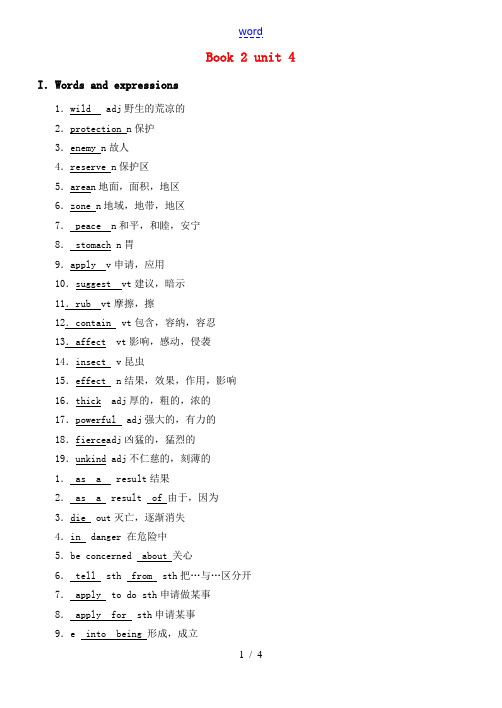
Book 2 unit 4 I.Words and expressions1.wild adj野生的荒凉的2.protection n保护3.enemy n故人4.reserve n保护区5.arean地面,面积,地区6.zone n地域,地带,地区7. peace n和平,和睦,安宁8. stomach n胃9.apply v申请,应用10.suggest vt建议,暗示11.rub vt摩擦,擦12.contain vt包含,容纳,容忍13.affect vt影响,感动,侵袭14.insect v昆虫15.effect n结果,效果,作用,影响16.thick adj厚的,粗的,浓的17.powerful adj强大的,有力的18.fierceadj凶猛的,猛烈的19.unkind adj不仁慈的,刻薄的1. as a result结果2. as a result of 由于,因为3.die out灭亡,逐渐消失4.in danger 在危险中5.be concerned about 关心6. tell sth from sth把…与…区分开7. apply to do sth申请做某事8. apply for sth申请某事9.e into being 形成,成立10.protect sb from sth 保护某人免受II .key wordseg:理论应用于实践 A theory should be applied to practice.如果你要出国的话,你要做的第一件事就是向政府申请护照。
If you want to go abroad,the first thing you should do is to apply to your government for a passport.The rule applies to freshman only.这条规定只适用于大一学生。
高一英语人教版必修二第四单元学案设计

一、词汇变形Book2 Unit4 Wildlife Protection词汇导学案1. protect (v.) 保护--- protection (n.)--- protective(adj.) 防护的2. threat(n.) 威胁---threaten(v.) ---threatening(adj.) 威胁的3. decrease(v.) 减少---increase(v.) 增加4. danger(n.) 危险---endanger(v.)---endangered(adj.) 濒危的5. lose(v.) 丢失---lost(adj.) 丢失的---loss(n.) 损失---loser(n.) 失败者6. peace(n.) 和平---peaceful(adj.)7. respond (v. 反 应 )---response(n.)8.distant(adj.) 远的---distance(n.) 距离9.relief(n.) 减轻---relieve(v.) 缓解 ugh(v.) 大 笑 ---laughter(n.) 11.mercy(n.) 仁慈---merciful(adj. 仁慈的) --- merciless (adj. 毫 不 怜 悯 的 ) 12.important(adj.)---importance(n.) 13.contain(v.) 容纳---container(n.) 容器二、重点单词 14. certain(adj.) 确定的---certainty (n )---certainty(n.)---certainly(adv.)15. power(n.)---powerful(adj.) 强大的 16. attention(n.) 注意力---attentive(adj.)---attentively(adv.) 认真地17. affect(v.) 影响---effect(n.) 影响18.appreciate(v.) 感激--- appreciation(n.) 19.succeed(v.) 成功--- success(n.) ---successful(adj.)---successfully(adv.) 20.secure(adj.)---security(n.) ---insecure(adj.) 不安全的21. employ(v.) 雇佣---employment(n.) 工作---employer(n.) 雇主---employee(n.)雇员22. harm(v.& n.) 伤 害 ---harmful(adj.)23.expect (v.)期盼,预料---expectation (n.) ---unexpected(adj.) 意料之外的 24.faith(n.) 信任--- faithful(adj.) 忠诚的 --- faithfully(adv.)1. wild(动植物) 野生的 wild animals wild n. in the wild 在野外(地区) 荒芜的(lonely) a wild area(行为)无法无天的;放荡的 The boy is wild.(感情) 狂热的;疯狂的 The audience went wild. 观众疯狂了。
- 1、下载文档前请自行甄别文档内容的完整性,平台不提供额外的编辑、内容补充、找答案等附加服务。
- 2、"仅部分预览"的文档,不可在线预览部分如存在完整性等问题,可反馈申请退款(可完整预览的文档不适用该条件!)。
- 3、如文档侵犯您的权益,请联系客服反馈,我们会尽快为您处理(人工客服工作时间:9:00-18:30)。
人教版(2019)新教材高中英语必修第二册第四单元词汇学案UNIT FOUR1.Confucius [kən'fjuːʃəs]: n. 孔子Temple of Confucius: 孔庙Confucius Institute: 孔子学院1)Confucius was a great thinker, educator, and philosopher.2)Confucius was a pioneer in the field of education.孔子: (公元前551年9月28日-公元前479年4月11日),子姓,孔氏,名丘,字仲尼,鲁国陬邑[zōu yì] (今山东曲阜)人,祖籍宋国栗邑[ lìyì] (今河南夏邑),中国古代思想家、政治家、教育家、儒家学派创始人。
孔子开创私人讲学之风,倡导仁义礼智信。
有弟子三千,其中贤人七十二。
曾带领部分弟子周游列国十三年,晚年修订六经(《诗》《书》《礼》《乐》《易》《春秋》)。
去世后,其弟子及再传弟子把孔子及其弟子的言行语录和思想记录下来,整理编成《论语》。
该书被奉为儒家经典。
孔子是当时社会上最博学者之一,在世时就被尊奉为“天纵之圣”“天之木铎”,更被后世统治者尊为孔圣人、至圣、至圣先师、大成至圣文宣王先师、万世师表。
其思想对中国和世界(特别是亚洲)都有深远的影响,其人被列为“世界十大文化名人”之首。
2. mansion [ˈmænʃn]: n. 公馆;宅第Kong Family Mansion: 孔府1)My grandfather spared no money when he built this mansion.2)Compared with our old house, the new one is a mansion.3)What I need is just a small room, not a mansion. 3. cemetery [ˈsemətri]: n. 墓地;公墓tomb [tuːm]: n. 坟墓grave: n. 坟墓Cemetery of Confucius: 孔林1)A cemetery is a place where dead people’s bodies or their ashes are buried.2)The old man died and was buried in the cemetery.3)She rests beside her husband in the local cemetery.4. philosophy [fəˈlɒsəfi]: n. 哲学philosopher [fəˈlɒsəfə(r)]: 哲学家1)Xiao Kong is doing a research project on Confucius philosophy.2)Confucius is one of his favourite philosophers.3)He studied philosophy at Cambridge.4)Philosophy is too deep for me.5. descendant [dɪˈsendənt]: n. 后裔;后代;子孙generation [ˌdʒenəˈreɪʃn]: n.一代(人)from generation to generation: 世世代代;一代代1)Confucius has over 3 million descendants.2)As one of Confucius’ descendants, Xiao Kong’s name is recorded in the family tree.3)He says he’s a direct descendant of William shakespeare.6. individual [ˌɪndɪˈvɪdʒuəl]: n. 个人adj. 单独的;个别的person: n. 人- 1 -people: n. 人; 民族1)An idiom is an expression which means something different from the meaning ofthe individual words.2)Sometimes I feel that individuals can have little effect on such hugeenvironmental problems.3)The museum is open to both teams and individuals.7. heel [hiːl]: n. 足跟; (脚/袜子/鞋等的)后跟Achilles’ [əˈkili:z] heel: (喻)(希腊神话)阿喀琉斯的脚跟; 致命的弱点1)English is his Achilles’ heel.2)Lucy’s Achilles’ heel is that she cannot believe in others.3)She will buy shoes with a low/high heel.阿喀琉斯的脚跟/之踵[zhǒng]阿喀琉斯, 是凡人英雄珀琉斯和海洋女神忒[tè]提斯的爱子。
忒提斯为了让儿子炼成“金钟罩”, 在他刚出生时就将其倒提着浸进冥河。
遗憾的是, 阿喀琉斯被母亲捏住的脚后跟却不慎露在水外, 在全身留下了唯一一处“死穴”。
后来, 阿喀琉斯被帕里斯一箭射中脚踝[huái]而死去。
后人常以“阿喀琉斯之踵”譬喻这样一个道理:即使是再强大的英雄,也有致命的死穴或软肋。
8. kingdom [ˈkɪŋdəm ]: n. 王国;领域king: n. 国王queen: n. 女王; 王后prince: n. 王子; 王孙; 亲王princess: n. 公主; 王妃field/area: n. 领域1)What are the four countries of the United Kingdom? 2)The king is the most important person in a kingdom.9. chief [tʃiːf]: adj. 最重要的;最高级别的n.(公司或机构的)首领;酋长(复数: chiefs)main/major: adj.主要的important: adj. 重要的importance: n. 重要; 重要性the chief problem/reason: 主要问题/原因(理由)1)According to the text, what are two chief advantages of studying the history of acountry?2)Her chief worry was that she might fail in the test.3)The chief of the police station demanded severe punishments for such a person.4)The Indian chief was killed by four British soldiers.10. puzzle [ˈpʌzl]: n. 谜;智力游戏;疑问v. 迷惑;使困惑puzzling: adj. 令人迷惑的/困惑的puzzled: adj. (人感到)困惑的;迷惑不解的a word puzzle: 字谜be puzzled about sth: 对某事迷惑不解1)Getting to know a little bit about British history will help you solve this puzzle.2)What puzzles him is why that movie is so popular.3)These problems will puzzle the scientist.4)These problems are puzzling.5)The scientist is puzzled about these problems.- 2 -6)She had a puzzled look on her face.11.nearby [ˌnɪəˈbaɪ]: adv. 在附近adj. 附近的;邻近的(常在名词前)near: 在...附近be near to...: 距...近be far from...: 距...远1)In the 16th century, the nearby country of Wales was joined to the Kingdom ofEngland.2)Her mother lives in a nearby town. = Her mother lives in a town nearby.3)Her mother lives near the town.4)Though they all live nearby, they don’t know each other.12. join ... to...: 把…和…连接或联结起来join in sth/doing...: 参加(活动/运动会等)join sb in doing...: 参加某人做什么join up:连起来; 参军; 会合1)In the 16th century, the nearby country of Wales was joined to the Kingdom ofEngland.2)The island is joined to the mainland (大陆) by a bridge.3)You should never join an electric wire to a water pipe.13. break away (from sb/sth): 脱离;背叛;逃脱break out: (战争/火灾/疾病等)爆发break down: 毁掉; 坏掉; 抛锚; 身体垮掉; 分解(物理/化学)break up: 分解(物理); 拆开; 驱散; 拆散break with: 与…断绝关系break into…: 闯入break in: 闯入; 插话1)Finally, in the 20th century, the southern part of Ireland broke away from theUK, which resulted in the full name we have today: the United Kingdom of Great Britain and Northern Ireland.2)It was wrong for him to break away from all his good friends.3)The thief tried to break away from the policeman, but he failed.4)Some people in Taiwan want to break away from the Chinese mainland.14. belong [bɪ'lɒŋ]: v. 应在(某处);适应belong to...: 属于; 是…的成员(不能用于进行时态和被动语态)1)The four countries that belong to the United Kingdom work together in some areas.2)This truck belongs to Mrs. Smith.3)We belong to the Nature Club.4)This music really belongs in the new concert hall.15. as well as: 同(一样也); 和; 还1)They visited some factories, hospitals as well as the school.2)As well as playing football with my friends, I spend a lot of time with my pets.3)The teacher as well as her students enjoys listening to English songs.as well as, along with, together with等连接的名词或代词作主语时,谓语动词与其前面的名词或代词保持一致。
